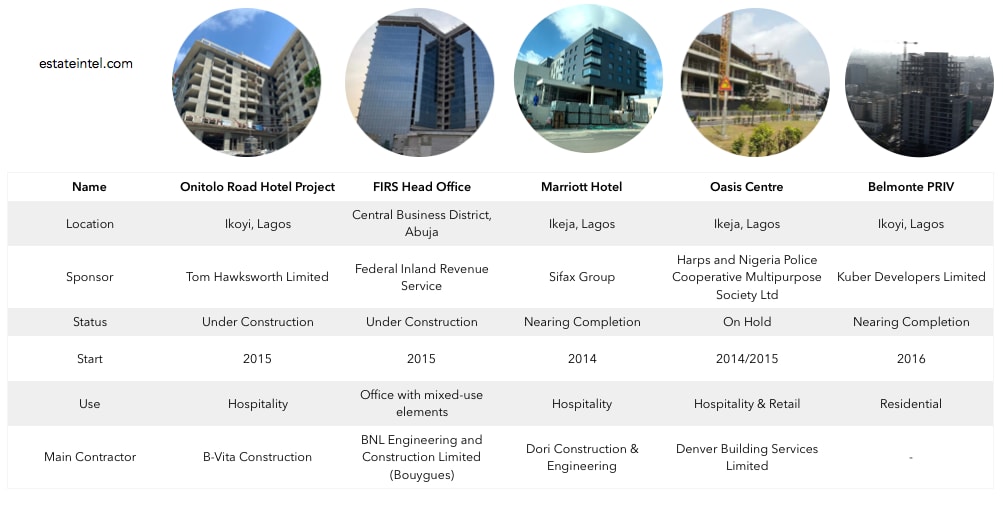Why these 10 Properties have been under construction for up to 5 years or more
Dolapo Omidire . 3 years ago

Share this post
Subscribe to our newsletter
The matrix below profiles 10 commercial real estate developments that have been under construction for at least 5 years. While there are a number of property-specific reasons these individual project timelines have stretched out, we can use them as case studies to identify key wider market themes that describe this trend.
The matrix below profiles 10 commercial real estate developments that have been under construction for at least 5 years. While there are a number of property-specific reasons these individual project timelines have stretched out, we can use them as case studies to identify key wider market themes that describe this trend.

Why these 10 Properties have been under construction for up to 5 years or more

Why these 10 Properties have been under construction for up to 5 years or more
Commercial real estate investing is a long term game that may require 7 – 10 years to take an asset through its key stages including initial conceptualisation, construction and then complete stabilisation. For Heritage Place, Lagos’ foremost office development, this process took 8 years and construction.
- Initial Investment: 2011
- Construction Commencement: 2013
- Construction Completion: 2016
- Asset Stabilisation at c. 90% Occupancy: YE:2019
Using an average of a few high-profile and similarly sized projects, a 3 – 4-year timeline can serve as a fair average, however, some projects, including the 10 above do not always follow the same trajectory. Here’s why:
Compliance and Approvals
According to the World Bank’s 2020 Ease of Doing Business Index, Nigeria ranked 183 out of 190 countries when Registering property, and 55 of 190 countries when Dealing with Construction Permits. Though the index has noted significant progress in Dealing with Construction Permits, growing from 171 of 189 countries in 2015 to 55 of 190 countries in 2020, property developers and investors still point to approvals and permits and a key pain point.
Delays in this aspect go beyond slowing down the initial planning and conceptualisation phase but can also affect in-construction progress as changes to the design which require fresh approvals can occur quite frequently. Moreover, surprise charges from governmental agencies who are rent-seeking typically lead to periods where construction sites are shut down until the issues are resolved.
Some efforts have been made by State governments in Nigeria, especially Lagos, to ease these processes by attempting to digitise their databases, improve transparency or consolidate fees, however, more work needs to be done.
Market Forces
Changes in the macro-economic environment or wider real estate space may cause a change into the demand and supply dynamics that validated the case for investing. These changes may convince the developer to slow down, stop to reconsider or drive the financiers to stop the flow of capital.
A few examples of this over the past decade include the oil price induced recession during 2016, devaluation of the Naira, excess supply office space on the market after 2016, the post-Ebola reduction in hotel occupancy rates and the market-wide COVID market shake-up among others.
Funding Dries Up
Chief among the reasons for the stretched out timelines is funding. Without the capital, contractors cannot be paid and progress will either slow down significantly or come to a complete halt.
Debt capital supported commercial real estate developments with proper structures will require pre-leases or an indication of off-plan sales to prove demand for a project. This is important for bankers and financiers to keep the tap on the capital flowing. Where this demand is no longer apparent, funding sources may pull back to protect themselves.
Residential projects that typically rely heavily on presales are also vulnerable in this regard. Though some developers wait to achieve up to 60%-70% off-plan sales before hitting the site, others go as quickly as 25%, and may struggle to maintain a strong pace when off-plan sale activity reduces.
To ensure construction timelines are not prolonged, Tope Runsewe, Managing Director of Dutum Construction Company Limited, suggests that more thorough work be done during the planning and technical design stages and wants faster pre and during construction approval processes from governmental agencies. He adds that developers need to be better prepared financially, ‘…Personally, I feel if you don’t have at least 75% of the construction cost you should not move to site’.
Technical and design-related issues
Though design alterations mid-project are almost inevitable, some instances are much worse than others and these can lead to delays. Alterations to the facade, design or floor plate may often appear minor, however, the corresponding changes required from a structural, mechanical and electrical engineering perspective are often significant, especially when the changes have to be retrofitted into an existing project.
Nonetheless, a few new developments, though smaller, are great examples of relatively efficient and speedy construction. These include 47 Glover in Ikoyi which was completed in 26 months by El-alan Construction and the Afriland Development in Victoria Island which is nearing completion after approximately 18 months of above-ground construction by Cappa & D’alberto.
What do you think causes the delays in construction and how can we mitigate or plan for them? Join us on LinkedIn to discuss.
Related News
You will find these interesting

Bisi Adedun . 6 months ago
Jabi is an area located within the phase 2 vicinity of the Abuja Municipality, known for housing the iconic Jabi Lake. I...
abuja
Jabi Lake

Tilda Mwai . 7 months ago
africa
Africa real estate outlook

Deborah Jesusegun . 10 months ago
African
building